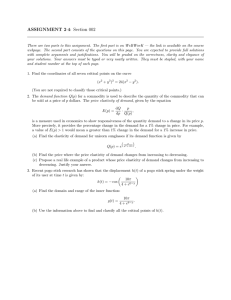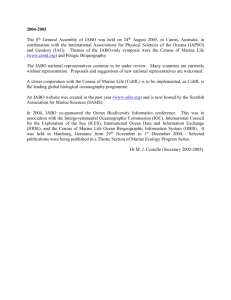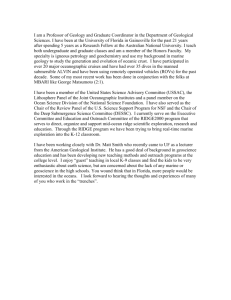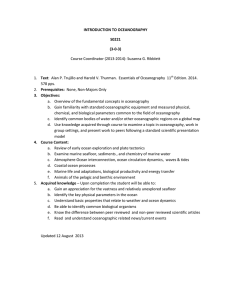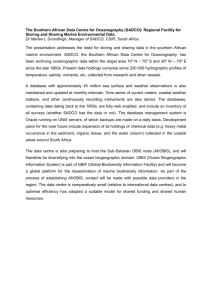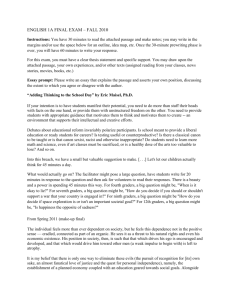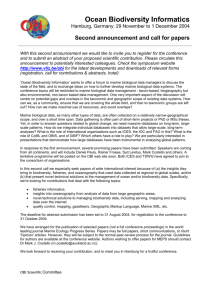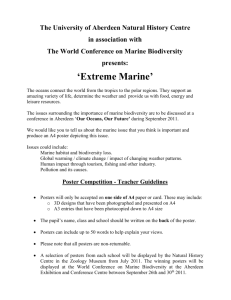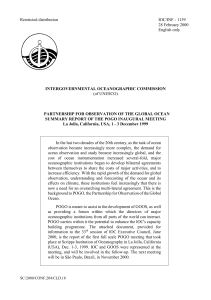Restricted Distribution IOC/INF-1189 Paris, 8 April 2003
advertisement
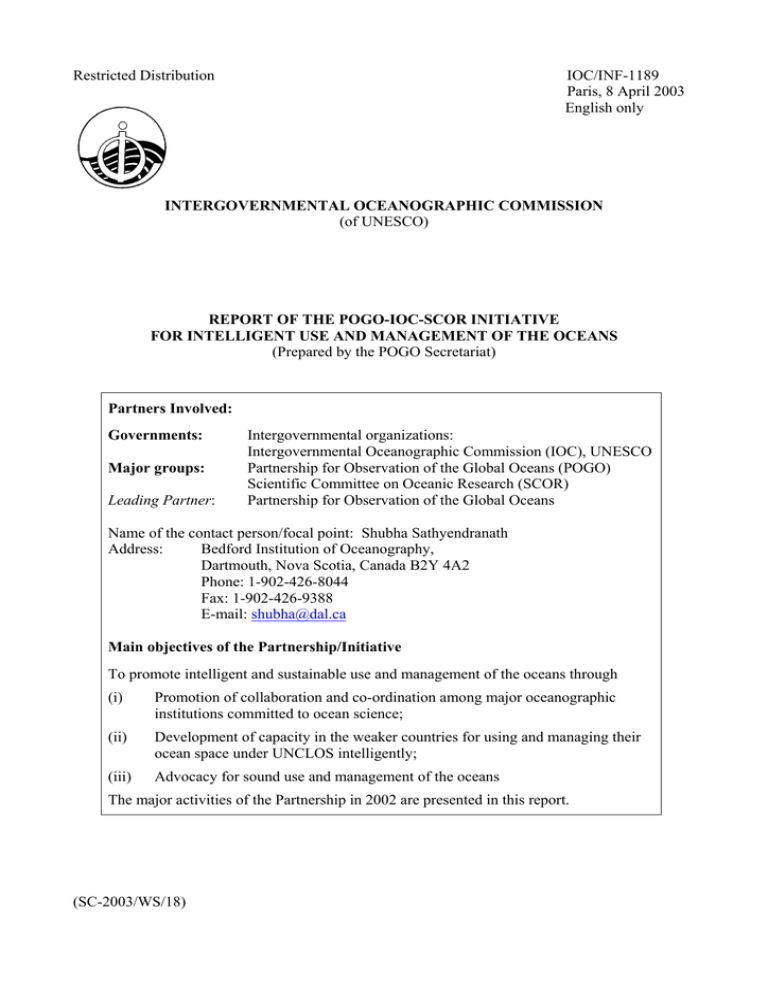
Restricted Distribution IOC/INF-1189 Paris, 8 April 2003 English only INTERGOVERNMENTAL OCEANOGRAPHIC COMMISSION (of UNESCO) REPORT OF THE POGO-IOC-SCOR INITIATIVE FOR INTELLIGENT USE AND MANAGEMENT OF THE OCEANS (Prepared by the POGO Secretariat) Partners Involved: Governments: Major groups: Leading Partner: Intergovernmental organizations: Intergovernmental Oceanographic Commission (IOC), UNESCO Partnership for Observation of the Global Oceans (POGO) Scientific Committee on Oceanic Research (SCOR) Partnership for Observation of the Global Oceans Name of the contact person/focal point: Shubha Sathyendranath Address: Bedford Institution of Oceanography, Dartmouth, Nova Scotia, Canada B2Y 4A2 Phone: 1-902-426-8044 Fax: 1-902-426-9388 E-mail: shubha@dal.ca Main objectives of the Partnership/Initiative To promote intelligent and sustainable use and management of the oceans through (i) Promotion of collaboration and co-ordination among major oceanographic institutions committed to ocean science; (ii) Development of capacity in the weaker countries for using and managing their ocean space under UNCLOS intelligently; (iii) Advocacy for sound use and management of the oceans The major activities of the Partnership in 2002 are presented in this report. (SC-2003/WS/18) IOC/INF-1189 I. Training, Education and Capacity Building 1. Fellowship Programme: The POGO-IOC-SCOR Fellowship Programme was launched in 2001. The programme (cosponsored by IOC and SCOR) facilitates visits (1-3 months long) of scientists/technicians and graduate students from developing countries (and economies in transition) to oceanographic labs in other countries, for training on selected areas related to the collection of ocean observations, their analysis and interpretation. The fellowship provides international airfare and subsistence allowance for the fellowship period (the actual amount will be tailored to meet local conditions, but will not exceed US$ 1,000 per month). The trainee’s institute will bear all expenses incurred by the fellow in his/her own nation (domestic travel, visa costs, etc.), and the host institute will waive any bench fees that they may normally charge trainees. (Details on POGO web site.) Thirteen Fellowships have been offered in 2001, and another 13 Fellowships have been awarded in 2002. The Fellowships are not restricted to POGO members. 2. Participation in Training Courses An advanced course on “Primary Production: Theory, Modelling and Estimation by Remote Sensing” was held from 21 October to 1 November 2002 at the University of Concepción (UdeC), Chile. It was held under the auspices of IOC/UNESCO, the Chilean Ministry of Education (MECESUP), Minera Escondida, the DAAD, the UdeC's School of Graduate Studies and the Centre for Oceanographic Research (COPAS). Additional funding was provided by the International Ocean-Colour Coordinating Group (IOCCG) and by the Partnership for Observation of the Global Ocean (POGO) to facilitate participation by students from outside Chile. The course was on the theory and modelling of primary production at large-scales and emphasised the complementary aspects of in situ and satellite data, and how they can be combined to enhance and improve the applications of ocean observations. The training course was held on 21 – 31 November 2002. The morning sessions were devoted to formal lectures and the afternoon sessions to computer lab work. POGO supported two lecturers and five students from abroad (four from South America and one from South Africa). Dr. Trevor Platt (Canada), Dr. Mark Dowell (USA), Dr. César Fuentes-Yaco (Mexico), Dr. Osvaldo Ulloa (Chile), Dr. Vivian Lutz (Argentina), Mr. Gabriel Varas (Chile) and Dr. Shubha Sathyendranath (POGO) provided instruction at the training course. The training course was initiated by Dr. Osvaldo Ulloa. There were 26 students in all: 8 of them from Chile, and 18 international. The quality of the students and their level of preparation for a similar course, and their dedication, enthusiasm and hard work during the course, were exemplary. Many of them took the course for credit at graduate level. There is strong request to repeat the course in the region periodically (perhaps every two or three years) given the level of interest. There were also serious discussions on forming regional alliances and regional programmes to address common problems related to infrastructure (ship, equipment) and manpower, to ensure effective follow-up to the training received. The organisation and facilities provided by the University of Concepción for the course were excellent. The local organisers also made laudable efforts to provide lodging for the foreign students. The logistical support was great in all respects. We have a valuable partner in these efforts in the University of Concepción. 3. POGO Participation in the UdeC – WHOI Austral Summer Institute At its second meeting in São Paulo, POGO resolved to contribute to the enhancement of existing initiatives at regional or bilateral levels, when appropriate. In this spirit POGO supported IOC/INF-1189 page 2 the travel of two Argentinean students to an Austral Summer Institute (ASI) organised as part of a bilateral agreement between Universidad de Concepción and the Woods Hole Oceanographic Institution. The local expenses of the Argentinean students were borne by UdeC. The ASI is a series of intensive courses on various aspects of ocean observations aimed at students from Chile, with expert instructors and lecturers drawn from Chile and the USA. Thus POGO was able to facilitate Argentinean participation in this initiative. At POGO-3, it was decided to support the participation of five trainees from South American countries at the Austral Summer Institute in 2002. The Department of Fisheries and Oceans, Canada, has provided financial support towards this initiative. Similar support is planned for 2003. 4. POGO Co-sponsorship of SEREAD Along with seven other organisations and programmes, POGO has co-sponsored a project called SEREAD (Scientific Educational Resources And Experience Associated with the Deployment of Argo drifting floats in the South Pacific Ocean) that has been developed to promote awareness of the Argo programme among school children in the South Pacific islands. The students will be encouraged to “adopt” a float, follow its trajectory, and study its observations. Dr. Dean Roemmich reported on the progress of SEREAD at the Third Meeting of POGO. 5. Advertising Existing Opportunities The POGO web site1 is being developed as a site where existing opportunities for training and education in oceanography can be announced and advertised. II. Biodiversity Initiative in South America 1. Background The idea of a South American Biodiversity Meeting originated following a Biology Workshop held by POGO in June 2001 (Report of the Biology Workshop is available on the POGO web site). The goal of the Workshop was to have a small group of experts advise POGO Directors on what could be done by POGO to enhance biological observations (long-term, large-scale). The recommendations from the workshop were presented at the general meeting, POGO-3, in the end of November 2001. Further, during the previous POGO-2 meeting (Brazil) the need to enhance oceanographic observations in the Southern Hemisphere has been discussed. Putting these two priorities together, a workshop was proposed to facilitate enhancement of biological oceanographic observations in the Southern Hemisphere. It was further observed that the goals of POGO expressed above coincided with those of the Census of Marine Life (CoML) in promoting studies of marine biodiversity in the Southern Hemisphere. Therefore, a joint proposal was prepared and funding for the Workshop secured from the Sloan Foundation. The workshop was held at the University of Concepción where the Chilean Government, through the National Commission for Scientific and Technological Research, has recently funded a project establishing the first National Centre for Oceanography. It has, furthermore, a long tradition in the area of marine biodiversity and strong ties with other universities, both national and regional. The meeting took place in October 2002. 1 http://ocean-partners.org/ IOC/INF-1189 page 3 2. Objectives From the point of view of interested scientists of the region, one of the main objectives of the South-American Marine Biodiversity Workshop was to learn both about the activities and goals of CoML and POGO, and about opportunities for international cooperation in new projects relating biodiversity and ocean observations. Another major objective of the workshop was to learn about the activities of South American countries on these subjects and their national priorities. To accomplish this, a small number of South American experts were invited to offer overview presentations. Additionally, nonSouth American scientists with expertise and experience in the SA marine realm were invited. The dual strategies of the CoML to attain its goals are to develop key projects that explore unique marine habitats in particular regions and to create regional committees to support these projects and encourage CoML approaches to other habitat zones. So far, the only CoML activities in the Southern Hemisphere are in the Western Pacific. This leads to the final objective: to identify possible new projects addressing problems of either regional (such as the Humboldt biome, and the Sub-Antarctic biome) or global (for example marine mammal migrations and South Pacific jackmackerel migrations) relevance relevant to the study of marine biodiversity. Waters around South America comprises a very large marine region, for the most part still unexplored. Therefore, a regional biodiversity effort appears to be most timely, to: (1) gain a precise insight on what is known and what is unknown, what is at present being done, and what is the potential for further activity regionally on the subject of biodiversity; and (2) explore how the present effort could be enhanced through both regional coordination and the participation of scientists from the developed world. New approaches have to be integrated with scientific effort and financial resources already in place. 3. Report of the Workshop The participants from the South American countries provided written papers providing the national status of efforts to monitor marine biodiversity and provided priorities for new initiatives. These reports (after revision) are to be submitted for publication in a peer-reviewed journal the Revista Chilena de Historia Natural. The workshop was divided into two parts. In the first part, there were presentations from national coordinators from each of the South American Countries represented at the meeting (Argentina, Brazil, Chile, Columbia, Ecuador, French Guiana, Peru, Uruguay and Venezuela) and also from representatives of some of the existing CoML projects with interests in, and relevance for, South America. The second half of the meeting was devoted to discussions on how the South American countries could collaborate and co-ordinate new international initiatives on marine biodiversity, within the umbrella of CoML. During the discussions, participants identified the following activities as priorities: (1) Organising a data base for storing and sharing information on marine biodiversity, along the lines of OBIS (Ocean Biogeographic Information System), (2) Participating in, and extending a few selected CoML initiatives to the South American waters, and (3) Initiating new field programmes to explore the marine environments around South America. IOC/INF-1189 page 4 The quality of the papers presented was excellent. The ideas that have emerged for new initiatives are innovative, and take into account the regional priorities. The participants decided to propose a small number of new and exciting projects as CoML initiatives. A SA committee for CoML has been formed. Professor Victor Ariel Gallardo, chairman of the organizing committee, will report on these activities at POGO 4. III. Advocacy Role 1. POGO News and Information Group: POGO has a News and Information Group that is active and works on enhancing public awareness of ocean-related issues. The group was chaired first by Mr. Don Michel (CSIRO, Australia). The chairmanship has now passed on to Ms. Cindy Clark (Scripps Institution of Oceanography, USA). Several participating organisations within POGO have nominated members to the POGO News and Information Group. During 2002 the group’s name was changed from Media and Outreach to News and Information to reflect more accurately the group’s function and expertise. The group is helping the Time Series Working Group with the creation of a Time Series Web site, and also with the creation of a Time Series Brochure. POGO web master Wendy Hunter continues to enhance the “In the News” section of the POGO web site. The group also seeks and posts relevant material for the Documents, Fellowships, Jobs and Training, and Outreach pages of the POGO web site. 2. The São Paulo Declaration: At the second meeting of POGO in São Paulo, much of the discussion focused on the need for improved observations of the oceans in the Southern Hemisphere. Many of the challenges that face mankind today (climate change, collapsing fisheries and rising sea level, to name only a few) are global in scope. Our response to these challenges must be based on knowledge of how the world oceans act as a system. Yet, the oceans remain grossly under sampled, and the Southern Hemisphere much more so than the Northern Hemisphere. The issue cannot be addressed without recognising a geopolitical reality: most of the oceans are in the Southern Hemisphere, and most of the major economies in the Northern Hemisphere. A concerted effort at the global level is needed to solve this problem. At the meeting, a resolution was passed to adopt the “São Paulo Declaration”, which draws attention to the need for enhanced oceanographic observations in the Southern Hemisphere. This declaration has been distributed widely. It is also on the POGO web site. In response to the São Paulo Declaration, the Japan Marine Science and Technology Centre (JAMSTEC) announced at POGO 3 that it was planning to organise an international circumpolar cruise in the Southern Hemisphere. This was hailed as a major initiative at the POGO-3 meeting. The cruise is now being planned as a truly international programme, under the leadership of JAMSTEC. Netherlands Institute of Sea Research (NIOZ), with international collaboration, has initiated a new project for three long-term time-series stations (two in the Indian Ocean). In the spirit of the São Paulo Declaration, the Atlantic Oceanographic and Meteorological Laboratory (AOML, USA) has initiated a new ZBT line from Cape Town to Buenos Aires. 3. POGO Brochure: A POGO brochure was prepared through the team effort of the News and Information Group. The brochure was printed and distributed in 2001. A second printing was facilitated by financial support from the Department of Fisheries and Oceans, Canada. The WOCE programme office was extremely helpful with mailing the brochures to some 2,000 oceanographers and meteorologists. IOC/INF-1189 page 5 POGO Members • Bedford Institute of Oceanography (Canada) • Bermuda Biological Research Station (Bermuda) • Chilean Consortium Consisting of SHOA (Servicio Hidrográfico y Oceanográfico de la Armada) Universidad de Concepción • Commonwealth Scientific and Industrial Research Organisation (CSIRO) (Australia) • Dalhousie University (Canada) • French Consortium Consisting of IFREMER (Institut Français de Recherche pour l’Exploitation de la MER) INSU (L’Institut national des sciences de l’Univers du CNRS) • German Consortium consisting of: AWI (Alfred-Wegener-Institute), Bremerhaven IfM (Institute of Marine Research), Kiel GEOMAR (Research Centre for Marine Geosciences), Kiel • Japan Marine Science and Technology Centre (JAMSTEC) (Japan) • National Institute of Oceanography (India) • National Oceanic and Atmospheric Administration (NOAA) PMEL (Pacific Marine Environmental Laboratory) AOML (Atlantic Oceanographic and Meteorological Laboratory) Office of the Chief Scientist (NOAA HQ) • Netherlands Institute of Sea Research (Holland) • Scripps Institution of Oceanography (USA) • P.P. Shirshov Institute of Oceanology (Russia) • UK Consortium Consisting of Southampton Oceanography Centre Plymouth Marine Sciences Partnership (includes Plymouth Marine Laboratory) Proudman Oceanographic Laboratory • Universidad de São Paulo (Brazil) • Woods Hole Oceanographic Institution (USA)
